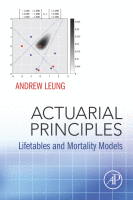Browse content
Table of contents
Actions for selected chapters
- Full text access
- Book chapterAbstract only
Chapter One - Lifetables and their applications
Pages 1-2 - Book chapterAbstract only
Chapter Two - Lifetables and the principle of equivalence
Pages 3-4 - Book chapterAbstract only
Chapter Three - Modelling mortality
Pages 5-7 - Book chapterAbstract only
Chapter Four - Basic types of benefit (CT5: §1, §2, §3.4, §4)
Pages 9-19 - Book chapterAbstract only
Chapter Five - Annuities payable frequently – a simpler approach
Pages 21-22 - Book chapterAbstract only
Chapter Six - Benefits in continuous time (CT5: §1.8, 2.8)
Pages 23-28 - Book chapterAbstract only
Chapter Seven - Select mortality (CT5: §3.6)
Pages 29-31 - Book chapterAbstract only
Chapter Eight - Benefits involving multiple lives (CT5: §8, §9)
Pages 33-35 - Book chapterAbstract only
Chapter Nine - The last survivor status
Pages 37-42 - Book chapterAbstract only
Chapter Ten - Pricing and reserving in theory (CT5: §5)
Pages 43-54 - Book chapterAbstract only
Chapter Eleven - Pricing in practice (CT5: §6, §7)
Pages 55-59 - Book chapterAbstract only
Chapter Twelve - Multiple decrement models (CT5: §10.2, §13)
Pages 61-65 - Book chapterAbstract only
Chapter Thirteen - Defined benefit superannuation (CT5: §14)
Pages 67-74 - Book chapterAbstract only
Chapter Fourteen - Life insurance modelling (CT5: §10; §11)
Pages 75-76 - Book chapterAbstract only
Chapter Fifteen - Profit signature
Pages 77-84 - Book chapterAbstract only
Chapter Sixteen - Multiple decrements and multiple states (CT5: §10)
Pages 85-93 - Book chapterAbstract only
Chapter Seventeen - More complex benefits on multiple lives (CT5: §9)
Pages 95-102 - Book chapterAbstract only
Chapter Eighteen - Risk factors in mortality
Pages 103-105 - Book chapterAbstract only
Chapter Nineteen - Types of life tables
Pages 107-114 - Book chapterAbstract only
Chapter Twenty - Constructing a life table
Pages 115-116 - Book chapterAbstract only
Chapter Twenty-One - Maximum likelihood estimation
Pages 117-122 - Book chapterAbstract only
Chapter Twenty-Two - Binomial and Poisson models (CT4: §10)
Pages 123-127 - Book chapterAbstract only
Chapter Twenty-Three - The Poisson model
Pages 129-130 - Book chapterAbstract only
Chapter Twenty-Four - The Kaplan–Meier estimator (CT4: §8)
Pages 131-139 - Book chapterAbstract only
Chapter Twenty-Five - The Cox regression model (CT4: §9)
Pages 141-147 - Book chapterAbstract only
Chapter Twenty-Six - Graduation
Pages 149-151 - Book chapterAbstract only
Chapter Twenty-Seven - Graduation techniques (CT4: §12)
Pages 153-158 - Book chapterAbstract only
Chapter Twenty-Eight - Methods of estimation of the parameters
Pages 159-163 - Book chapterAbstract only
Chapter Twenty-Nine - Assessing a graduation (CT4: §13)
Pages 165-170 - Book chapterAbstract only
Chapter Thirty - Summary: estimation and graduation
Pages 171-173 - Book chapterAbstract only
Chapter Thirty-One - Experience rating and Markov processes
Pages 175-182 - Book chapterNo access
Appendix A - International actuarial notation
Pages 183-186 - Book chapterNo access
Appendix B - Useful mathematical techniques
Pages 187-191 - Book chapterNo access
Appendix C - Exercises for Section 1.9 – defined benefits
Pages 193-199 - Book chapterNo access
Appendix D - Sample exams
Pages 201-244 - Book chapterNo access
Bibliography
Page 245 - Book chapterNo access
Index
Pages 247-250
About the book
Description
Actuarial Principles: Lifetables and Mortality Models explores the core of actuarial science: the study of mortality and other risks and applications. Including the CT4 and CT5 UK courses, but applicable to a global audience, this work lightly covers the mathematical and theoretical background of the subject to focus on real life practice. It offers a brief history of the field, why actuarial notation has become universal, and how theory can be applied to many situations. Uniquely covering both life contingency risks and survival models, the text provides numerous exercises (and their solutions), along with complete self-contained real-world assignments.
Actuarial Principles: Lifetables and Mortality Models explores the core of actuarial science: the study of mortality and other risks and applications. Including the CT4 and CT5 UK courses, but applicable to a global audience, this work lightly covers the mathematical and theoretical background of the subject to focus on real life practice. It offers a brief history of the field, why actuarial notation has become universal, and how theory can be applied to many situations. Uniquely covering both life contingency risks and survival models, the text provides numerous exercises (and their solutions), along with complete self-contained real-world assignments.
Key Features
- Provides detailed coverage of life contingency risks and survival models
- Presents self-contained chapters with coverage of key topics from both practitioner and theoretical viewpoints
- Includes numerous real world exercises that are accompanied by enlightening solutions
- Covers useful background information on how and why the subject has evolved and developed
- Provides detailed coverage of life contingency risks and survival models
- Presents self-contained chapters with coverage of key topics from both practitioner and theoretical viewpoints
- Includes numerous real world exercises that are accompanied by enlightening solutions
- Covers useful background information on how and why the subject has evolved and developed
Details
ISBN
978-0-323-90172-7
Language
English
Published
2022
Copyright
Copyright © 2022 Elsevier Inc. All rights reserved.
Imprint
Academic Press
